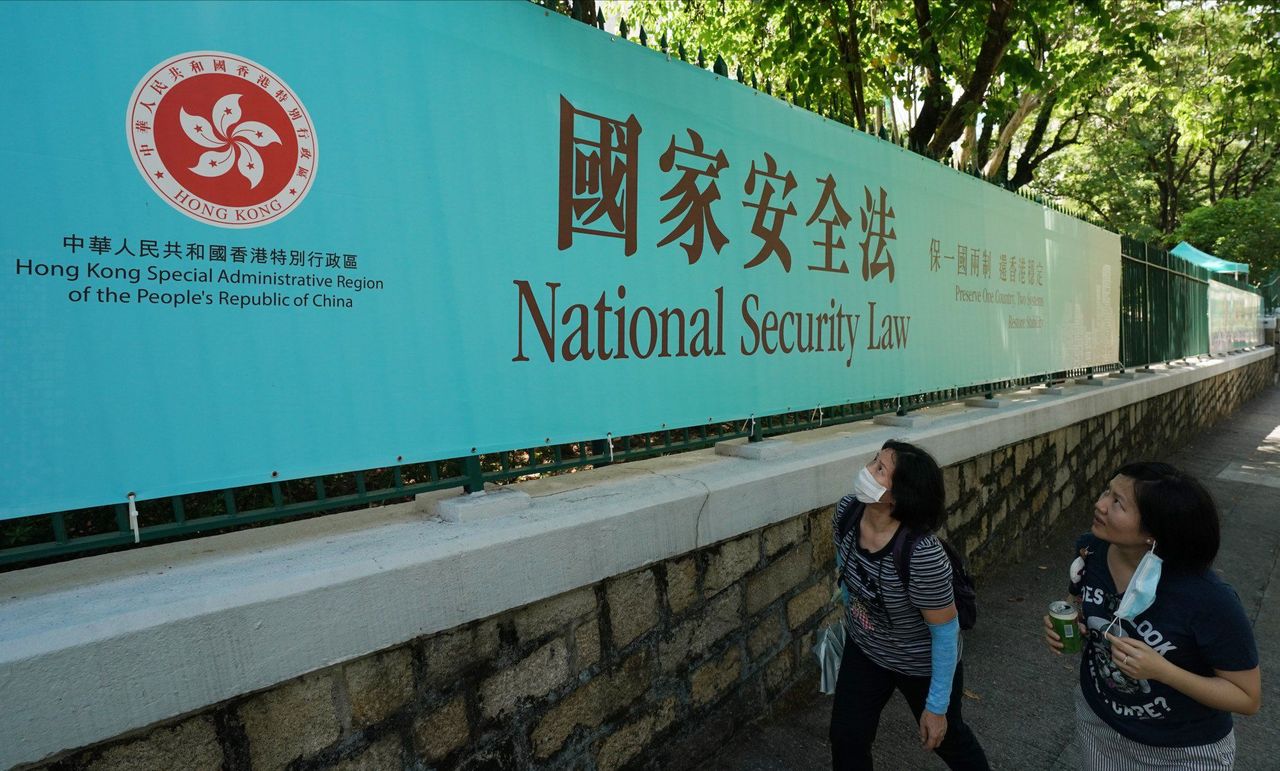Hong Kong News

Hong Kong national security: plan to allow prosecutors to appeal judges’ acquittals
Hong Kong prosecutors will be allowed to appeal against an acquittal by High Court judges over their understanding of the law concerning national security cases which were tried without a jury under a proposal by authorities.
The Department of Justice, in a consultation paper, argued the present practice, which does not allow the prosecution to appeal against an acquittal by a panel of judges trying a national security case in the Court of First Instance, was a “legal lacuna” – a gap in the law –, which had given rise to an “anomaly”.
The secretary for justice may appeal against an acquittal by a magistrate or the District Court under existing legislation “by way of case stated” – centring on judges’ understanding of the law rather than their findings of the facts – or ask for a review of any sentence passed.
 Two women look at a banner advertising the National Security Law.
Two women look at a banner advertising the National Security Law.
But the prosecution does not enjoy such a right against an acquittal of a defendant after a full trial in the Court of Final Instance. It is also barred from taking the case to the Court of Final Appeal if a jury reached the decision in the Court of Final Instance.
While most cases in the Court of First Instance are tried by a jury, the Department of Justice said that cases involving national security offences could also be heard before a panel of three judges, as stipulated in the 2020 Beijing-imposed legislation.
“Just as there is a legitimate public interest in allowing the prosecution to appeal against an erroneous verdict of acquittal by a magistrate or the District Court by way of cases stated, there is no reason why the prosecution should not, in similar circumstances, be allowed to appeal against an erroneous verdict of acquittal by a panel,” the department said in the paper.
“This appeal mechanism is especially important in the context of handling cases concerning offences endangering national security. It is necessary to ensure proper discharge of the judicial authorities’ duty under the Hong Kong national security law to effectively prevent, suppress and impose punishment for acts and activities endangering national security.”
It also highlighted remarks by the Legislative Affairs Commission of the National People’s Congress Standing Committee, China’s top legislative body, in December that the city “should amend and refine the relevant local legislation in a timely manner and resolve legal issues encountered in the implementation of the national security law through local legislation as far as practicable”.
The department proposed to address the “lacuna” by amending the Criminal Procedure Ordinance to provide the secretary for justice the right to appeal against a verdict or order of acquittal by a three-judge panel trying a case concerning national security offences without a jury within 14 days.
The proposed appeal mechanism, which the department said was “necessary and legitimate”, would only be related to the judges’ understanding of the law, and cases being tried in the Court of First Instance by a jury, whether or not they concerned national security, would not be affected by the amendment.
The Court of Appeal, under the proposal, could direct the resumption of a trial or retrial of the defendant if it was satisfied there were sufficient grounds for interfering with the verdict.
The department has asked the legal community to submit their views by May 6.
Professor Simon Young Ngai-man, an associate research dean in the University of Hong Kong’s law school, said the Anglo-American rule of no government appeals against jury acquittals had prevailed in the city because of the principle of double jeopardy and the importance of finality.
“This proposed reform will not disturb this rule,” he said.
“The reform does fix an anomaly in that, while the prosecution can appeal acquittals by judge-only trials in the two lower trial courts, it cannot when the Court of First Instance judges acquit or stay proceedings in national security cases. So, in this sense, the reform can be justified in principle.”
Young said he did not see the proposals as an erosion of the sanctity of jury acquittals because the reform was only directed at judge-only trials.
Grenville Cross, a former director of public prosecutions, said the proposal was in the public interest as it was designed to ensure prosecutors would be given the right to appeal against an “erroneous” judgment by a three-judge panel trying national security cases, in the same way as a ruling by a district judge or magistrate.
“Suspects, if they are to be acquitted, should be acquitted on the basis of the merits of the case, and not because the trial judges have misapplied the law and messed things up,” he said.
“If offences are very serious, as with those under the national security law, it is clearly unacceptable that the outcome of the trial should be ultimately decided by a legal blunder rather than by a proper assessment of the issues.”
The national security law rules that the secretary for justice has the power to issue a certificate to order the replacement of a jury with a three-judge panel. It was among the provisions in the legislation that attracted a torrent of criticism from legal experts, who argued it went against the traditions of a common law system.
Hong Kong’s first national security law-related prosecution went to trial in 2021 without a jury.
Teresa Cheng Yeuk-wah, justice secretary at the time, argued that a conventional trial in the case of Leon Tong Ying-kit would put the safety of jurors at risk.
Tong challenged the absence of a jury, but the appeal was dismissed.











